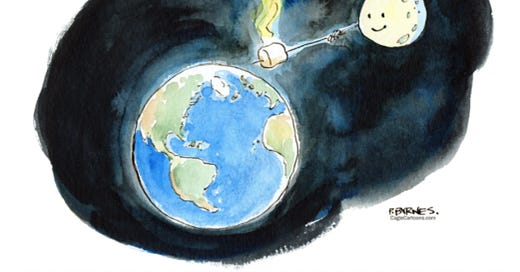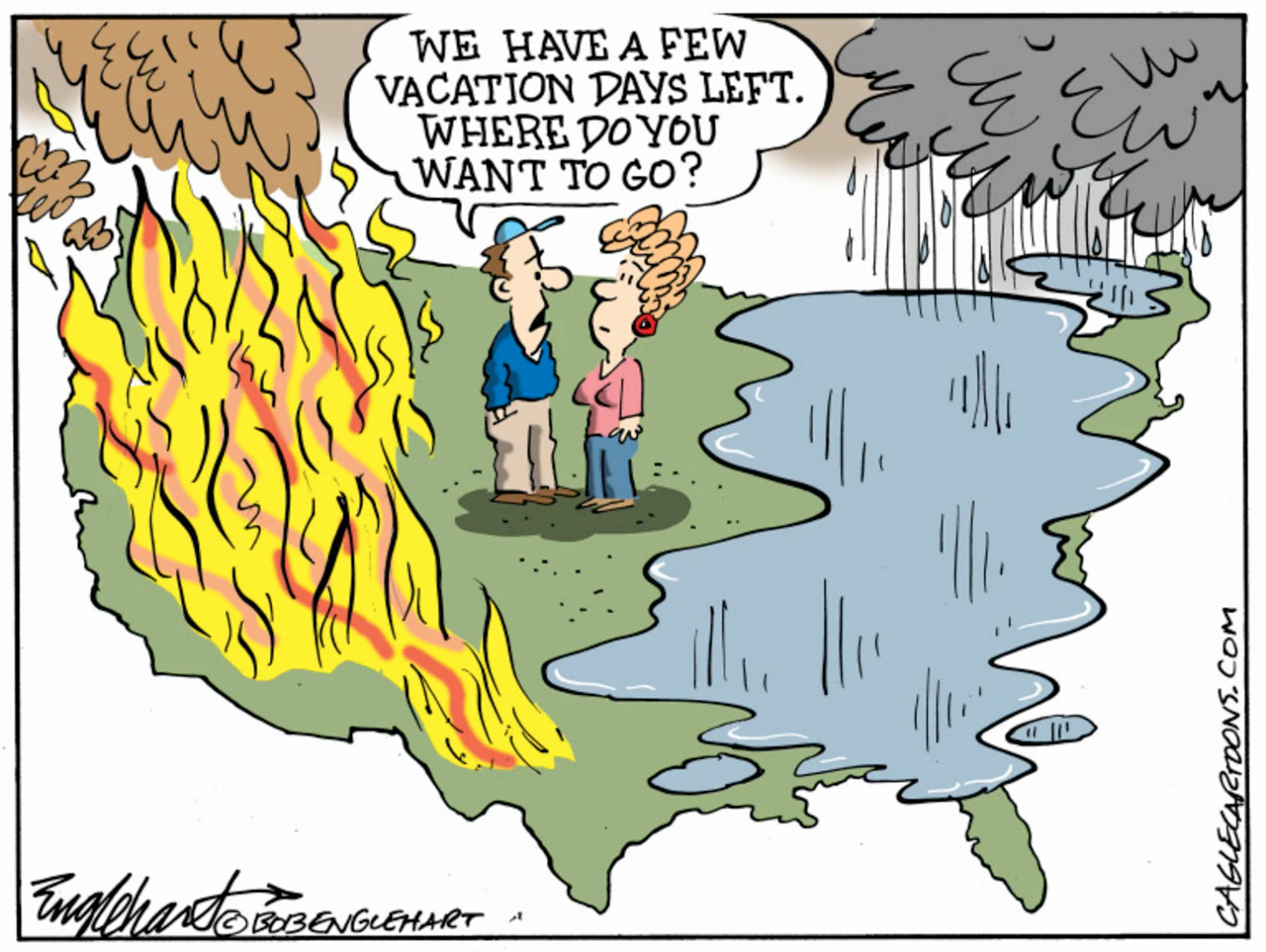When I Warned About Climate Change--in 1984
After another week of wild wildfires and record floods: It was all predictable, if you were paying attention, as in my early book. Plus, Jackson Browne's own warning and a few cartoons.
I've never thought of myself of a pioneer in warning about climate change, but maybe…just a little. Back in 1984, Viking published a book (my second) that I wrote with Pascal J. Imperato, titled Acceptable Risks, which examined how regulators, and individuals, choose to ignore certain hazards--such as pollution, smoking or living in earthquake-prone California--while taking action against others, often in a highly irrational way. The penultimate chapter explored an emerging (but not widely recognized) danger we called "The Ultimate Risk: The Greenhouse Effect." That is what it was called before it was referred to as "global warming" and then more accurately and broadly, "climate change." Back in the good old days we figured we still had plenty of time to address it. In that period, nuclear threat was the prime concern. See my reflection below, after the usual cartoons and at the bottom Jackson Browne’s “Before the Deluge.” Please share—and subscribe, it’s still free.
The Greenhouse Defect
Recently I decided to check back on that chapter, which I penned (in 1983), for the first time in a few years. What I found: There's not much new under the ever-hotter sun. The "inconvenient truth" of global warming has been told for decades--Dr. James Hansen was featured in our chapter--to little avail. In fact, the chapter in Acceptable Risks opens with a warning about the Antarctic ice sheet melting and a future rising of the sea levels likely to "submerge" coastal cities.
The paragraph that followed: “There have been warming trends before, but never one so rapid as this -- virtually overnight on the geological clock. Rather than having several hundred years to cope with the changes it may bring, humankind will have to adjust in little more than half a century.” Of course, we are now nearly 40 years into that half-century.
"More than a severe disruption of the world economy is at stake," I wrote. "The very survival of Earth's highest forms of life may be on the line." But, I advised, "Something can be done to prevent--or at least mitigate--this threat. On a global basis, humankind can cut down its burning of fossil fuels, stabilizing the excessive accumulation of carbon dioxide in the earth’s atmosphere that creates the hazard known as the Greenhouse Effect.
"There is no sign, however, that we have the slightest interest in doing this."
Other mitigation angles that I floated ranged from more scrubbers on smokestacks and “going solar” to developing “synfuels” and eating less meat.
Back then, scientists felt sure the warming would soon come--they accurately projected a one degree global rise in 20 years--but that normal temperature cycles, including a recent slight decline (then), were probably masking the trend, and "the lack of clear-cut evidence for a major warming effect may have terrible consequences, for it has already undermined efforts at getting governments of the world's nationals to deal with the threat of such an effect."
When the National Academy of Sciences released a report in 1983 asserting that the Greenhouse Effect was not only inevitable but imminent, President Reagan’s science advisor called it “unnecessarily alarmist.” Time magazine claimed it was “more interesting that alarming.” I predicted: “Even when the warming crunch comes, the reaction by government officials accustomed to muddling through environmental crises is unlikely to be fast or farsighted.”
So what was our Congress doing about it then? One expert told me that the current appropriation to study CO2 buildup was just $8 million, “and the government has a way of wasting three-quarters of that.” But there was sort of an excuse. Climate change, as noted, was still somewhat speculative, and the financial considerations were profound. One top scientist told me, "Let’s face it, we’re not going to see a change in an energy policy that flies in face of economics….To really know anything you’ll have to wait another thirty years, so we won't be able to convince Congress of anything until 2010."
As it turned out, we came to know a lot more, and worse, long before thirty years passed. As Leonard Cohen once put it, "We asked for signs / and signs were sent." And we’re now eleven years past 2010.
Song Pick of the Day
After the warnings, but “Before the Deluge,” 1976, from Jackson Browne, and much later with Joan Baez.
Greg Mitchell is the author of a dozen books, including the bestseller The Tunnels (on escapes under the Berlin Wall), the current The Beginning or the End (on MGM’s wild atomic bomb movie), and The Campaign of the Century (on Upton Sinclair’s left-wing race for governor of California), which was recently picked by the Wall St. Journal as one of five greatest books ever about an election. For nearly all of the 1970s he was the #2 editor at the legendary Crawdaddy. Later he served as longtime editor of Editor & Publisher magazine. He recently co-produced a film about Beethoven’s Ninth Symphony and now has written and directed his first feature, Atomic Cover-up, which will have its American premiere at a festival this spring.








